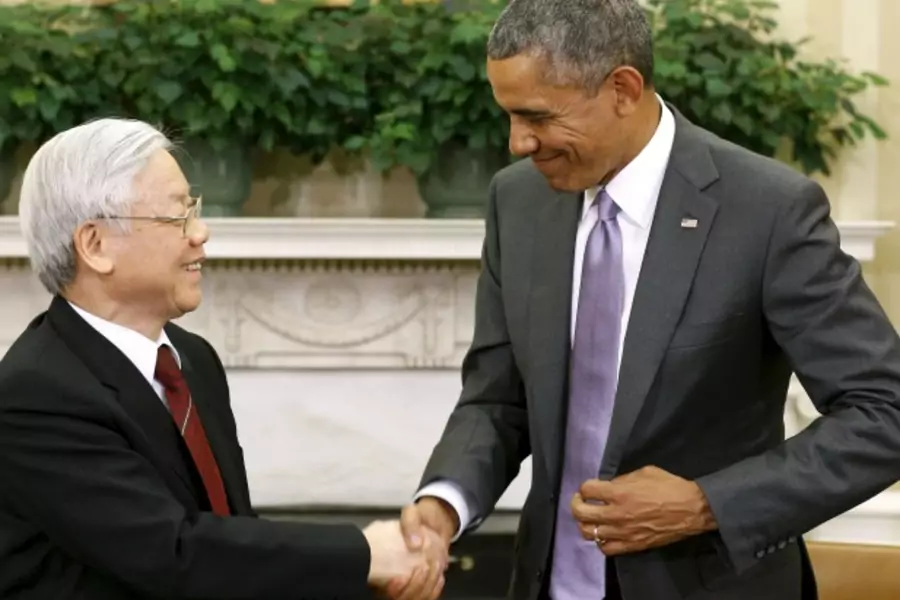More on:
After yesterday’s meeting between top Communist Party leader Nguyen Phu Trong and President Obama and Vice President Joseph Biden, the United States-Vietnam relationship seems poised to reach a new level. As the Washington Post noted, it is rare for the president to welcome at the White House a foreign leader who is not the head of state or head of government. But an exception was made for the Vietnamese leader, since Hanoi is becoming increasingly important to U.S. strategic interests in Asia, and since Nguyen may well wield as much power as Vietnam’s president or prime minister within Hanoi’s opaque leadership structure.
In a speech today at the Center for Strategic and International Studies, Nguyen is expected to call for a series of steps to move the bilateral relationship forward, and he will find his ideas reciprocated in Washington. As I noted in a working paper earlier this year, the U.S. relationship with Vietnam is well on its way toward becoming the United States’ closest strategic partnership in Southeast Asia, other than with Singapore. It is not impossible to imagine, in a decade or so, that Hanoi and Washington would become treaty allies. The joint vision statement issued just after Nguyen’s visit to the White House is but one sign of the new level of U.S.-Vietnam ties. Although Thailand is a U.S. treaty ally, Thailand’s decade-plus domestic turmoil has made it an unsteady, often distracted partner. The United States’ other treaty ally in Southeast Asia, the Philippines, is a vibrant democracy with close economic and cultural ties to the United States, but its regular (not reserve) armed forces are about half the size of Vietnam’s, and it remains tied down by its own ongoing insurgencies.
Vietnam, meanwhile, not only has an armed forces employing, overall, over 400,000 people but also an increasingly sophisticated navy. Hanoi also has slowly moved away from the strategy it has pursued since the 1990s of balancing relations between China, the United States, and other regional powers; the May/June 2014 South China Sea standoff between Hanoi and Beijing sped up Vietnam’s shift. As Alexander Vuving notes, “After the [South China Sea] incident, some members of the Vietnamese National Assembly called China an invader and an enemy, breaking a taboo that had been in place for more than two decades since the renormalization of Sino-Vietnamese relations in 1991.”
It is possible that, in the next decade, Vietnam will formally abandon the “three nos” of national defense policy---no military alliances, no foreign military bases on Vietnamese soil, and no reliance on external powers for Vietnamese defense---that has underpinned Hanoi’s strategy for decades. Vietnamese leaders have become so worried about China’s growing regional power that they have formed strategic partnerships, in the past five years, with the Philippines, Singapore, and Japan, among others. (The U.S.-Vietnam partnership is formally called a comprehensive partnership.) The partnership with the Philippines, which along with Vietnam is the most aggressive Southeast Asian claimant to the South China Sea, appears to have angered Beijing significantly---in some ways more than Vietnam’s ties with the United States.
By the end of President Obama’s second term, the U.S.-Vietnam relationship will likely become stronger in several ways. Vietnam’s willingness to join the TPP, despite being the poorest and, in many ways, most closed economy involved in the TPP, sends an important signal of Hanoi’s commitment to economic reform. Although Vietnam was already an important destination for U.S. investment, joining the TPP is likely to bring a new flow of investment from U.S. and Japanese firms, among others.
In addition, U.S. arms sales to Vietnam, allowed last year, are likely to be expanded. Although Vietnam’s human rights climate has not improved in the past five years---Freedom House notes that “in 2014, Vietnam continued to suppress freedom of expression online, in print, and through public demonstrations"---congressional opposition to arming Vietnam has waned, though a group of congresspeople did write the president expressing concern about human rights before Nguyen’s visit. On the eve of Nguyen’s visit, Human Rights Watch urged the United States and other countries to “press the Vietnamese government to end abusive policies and practices,” and used op-eds and other forums to remind Congress and other opinion leaders of Vietnam’s repressive rights record. But the lobbying appeared to have only a limited effect. Obama administration officials specifically told reporters that “there was no promise from Vietnam to release prisoners or amend free speech laws in exchange for [Nguyen’s] meeting with Obama,” according to the Washington Post.
Ten years ago, concerns about Vietnam’s rights record might have led Congress to seriously criticize, and try to block, an invite to Washington for the Party chief. But with the Republicans in control of the Senate for now, and Senator John McCain chairing the Armed Services Committee, the most influential congressional advocate of arming Hanoi and building closer ties wields significant power.
Obama also probably will visit Vietnam in the fall---he told Nguyen only that he would visit the country soon, but the visit will likely take place during Obama’s already-scheduled autumn trip to Asia. The presidential trip would highlight Hanoi and Washington’s closeness, provide a measure of support to pro-U.S. leaders within Vietnam’s ruling party, and potentially set the stage for the next U.S. president to consider a treaty alliance with the country.
More on:
 Online Store
Online Store
